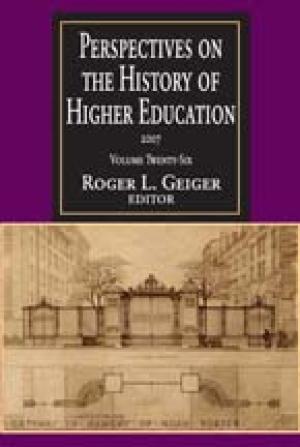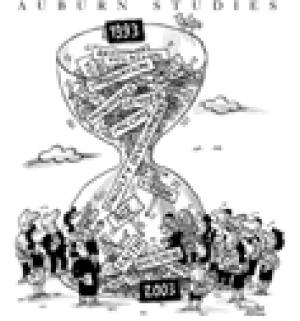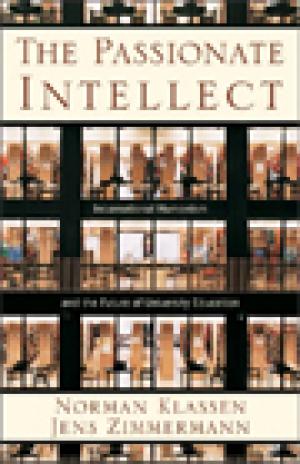Resources

An examination of the history of American Protestant theological education which focusses on aims and purposes and how (if at all) those ideals were incarnated in particular schools. (From the Publisher)

A series of reflections on this period in theological education. (From the Publisher)

This volume of "Perspectives" opens with two contrasting perspectives on the purpose of higher education at the dawning of the university age - perspectives that continue to define the debate today. First A. J. Angulo recreates the controversy surrounding the founding and early years of the Massachusetts Institute of Technology. Whether presented as an alternative to or a repudiation of the prevailing classical liberal education, MIT was rejected as inherently inferior by college defenders. Second is George Levesque's penetrating reappraisal of Yale president Noah Porter (1870-1886). Known almost solely for his role as a college defender, Porter is revealed as a vigorous scholar who became fixated with preserving the strengths of Yale College. As these matters were vigorously debated during these years, Porter's position was superseded by more powerful forces. Considering the cliches about liberal domination of higher education, it is seldom appreciated that the conservative movement has had a presence on campus throughout the postwar era. Jennifer de Forrest uses the reorganization of several conservative foundations to offer a critical appraisal of their impact. Known as the "four sisters," the Bradley Foundation, the Scaife Foundations, the Smith Richardson Foundation, and the Olin Foundation have been sharply focused on winning student support by funding conservative scholars and networking organizations, as well as student groups and newspapers. The tempestuous state of academic publishing is made more vivid by the clash of colorful characters. At the dawn of modern academic publishing, the "Educational Review", published by Columbia's Nicholas Murray Butler, was the foremost journal in its field. Paul McInerny interweaves the history of this journal with the educational issues of the late nineteenth century and the remarkable career of Columbia's longtime president. An additional actor is James McKeen Cattell, a noted psychologist and prolific academic publisher. As a Columbia professor, Cattell was also a thorn in the side of President Butler. In 1917 Butler fired Cattell for criticizing the war effort, an egregious breach of academic freedom even for those early times. Events took an ironic turn, however, when Cattell later acquired Butler's former Review. (From the Publisher)

From the urbanization of the Gilded Age to the upheavals of the Haight-Ashbury era, this encyclopedic work by Glenn Miller takes readers on a sweeping journey through the landscape of American theological education, highlighting such landmarks as Princeton, Andover, and Chicago, and such fault lines as denominationalism, science, and dispensationalism. The first such exhaustive treatment of this time period in religious education, Piety and Profession is a valuable tool for unearthing the key trends from the Civil War well into the twentieth century. All those involved in theological education will be well served by this study of how the changing world changed educational patterns. (From the Publisher)

This issue on theological school faculty and doctoral students, who are the theological faculty of the future, revisits a topic first studied ten years ago by the Auburn Center for the Study of Theological Education. The findings of the present study, compared with those of Auburn’s earlier research, suggest that theological education is, on the whole, a stable enterprise. On many items and indicators, theological faculty and theology and religion doctoral students today look and sound very much like those surveyed ten years ago. In some other areas there are slight but steady changes over the decade that may indicate trends and a few dramatic changes that invite analysis and interpretation. This report also address a new topic—theological faculty members’ teaching practices and attitudes toward teaching. (From the Publisher)

The reader may find the title of this excellent volume too modest for the rich presentation of American educational history it offers. Much more than a shaping of that historical record, the educational facts presented gain a special resonance from the richness of the social and economic background against which the history unfolds. (From the Publisher)

Taking on the challenge of the postmodernists of politics, Kenneth Minogue argues forcefully and persuasively that the current dominant philosophies of education rest upon a mistake. The fashionable belief that the university is society's handmaiden is confronted by a view of the university as an institution with an independent vitality and function. Minogue at one and the same time reminds us of the sources of admiration for university life in the medieval world, and how it rested squarely on its essential autonomy from the very social pressures that have come to define the modern university. The Concept of a University traces many confusions imposed by political ideology to a failure to distinguish academic inquiry from other kinds of intellectual activity, such as journalism, religious proselytizing, and high quality propaganda. Minogue holds that where the university lacks a clear sense of the difference between the academic and the pragmatic, its vitality is sapped by conflicting purposes. Much of the present debate about th crisis in universities rests upon a fundamental error of trying to fit them into some scheme of social functions. Minogue's analysis breaks through much muddled thinking on this subject, presenting instead a coherent, relevant, and stimulating approach to higher education. In a new introduction, Minogue tells us "we have become frightfully tolerant. Anyone can become anything, and we all belong to the one practical world of churning problems and solutions. There is no doubt that a new world is being born. It seems to be a world that will have little place for the disintegrated pursuit of truth. A great deal of old fashioned scholarship survives--partly by 'silence, cunning, and exile'--in the 'universities' of the present day, but little relationship remains between what we used to call 'universities' and the things called by that name today." (From the Publisher)

Chronicles the development of the intellectual culture of the Western university and proposes an approach to university education that keeps faith with central Christian doctrines. (From the Publisher)
Journal Issue.
Journal Issue.